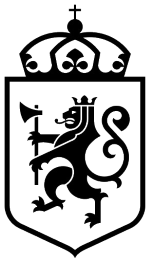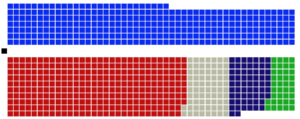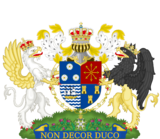Parliament of Aquitayne: Difference between revisions
mNo edit summary |
mNo edit summary |
||
| Line 39: | Line 39: | ||
*{{colorbox|#070066}} [[Republican Party (Aquitayne)|Republicans]] (63)<br> | *{{colorbox|#070066}} [[Republican Party (Aquitayne)|Republicans]] (63)<br> | ||
*{{colorbox|#88E014}} [[Earth Coalition|Environmentalists]] (38)<br> | *{{colorbox|#88E014}} [[Earth Coalition|Environmentalists]] (38)<br> | ||
| last_election2= [[Aquitaynian general election | | last_election2= [[2023 Aquitaynian general election|8 December 2023]] | ||
| next_election2= [[Aquitaynian general | | next_election2= [[2026 Aquitaynian general election|8 December 2026]] | ||
| voting_system1 = Royal Appointment | | voting_system1 = Royal Appointment | ||
| voting_system2 = {{wpl|Single Transferrable Vote}} | | voting_system2 = {{wpl|Single Transferrable Vote}} | ||
Revision as of 20:54, 15 January 2024
Parliament of Aquitayne Magnus Magnatus | |
|---|---|
 | |
| Type | |
| Type | |
| Houses | House of Lords House of Commons |
| Leadership | |
Prime Minister | |
| Structure | |
| Seats | 1,222 786 House of Commons 436 House of Lords |
 | |
Lords political groups | HM Government
HM Loyal Opposition
Dukes
Other groups
|
 | |
Commons political groups | HM Government
HM Loyal Opposition
Other groups
|
| Elections | |
| Royal Appointment | |
| Single Transferrable Vote | |
Commons last election | 8 December 2023 |
Commons next election | 8 December 2026 |
| Meeting place | |
 | |
| Camara Populi, Telora | |
The Parliament of Aquitayne (Vik'Rus: Magnus Magnatus) is the supreme legislative body in the Constitutional Monarchy of Aquitayne, and formerly its Overseas Territories. It alone possesses legislative supremacy over Aquitayne and its people. The head of the Parliament is the Sovereign of Aquitayne, currently His Majesty Samuel Reich, and its seat is at the Camara Populi in Telora. The House of Commons currently has 460 voting members, roughly 1 for every 235,000 Aquitaynian citizens.
The Parliament is a bicameral body, consisting of an upper house (the House of Lords) and a lower house (the House of Commons). According to the Constitution of Aquitayne, the monarch may appear in Parliament to break a tie in the House of Lords, and additionally appoints members to the House of Lords upon the advise of the Prime Minister. This role is commonly referred to as the King-in-Parliament. The House of Lords consists of members of the Great Houses of Aquitayne, as listed in the constitution, and at least five members of other noble families. The House of Lords has expanded to include life peers, who are additionally appointed by the Sovereign upon the advise and council of the Prime Minister. Additionally, the House of Lords is empowered to elect members to itself, which permits hereditary peers to be elected to the House of Lords, of which there are over 200.
The House of Commons is a democratically elected representative body of non-noble citizens of Aquitayne elected once every three years. Each House of Parliament meets in a separate chamber within the Camara Populi in Telora. Though it is not a constitutional convention that the Prime Minister be an elected member of the House of Commons, there has never been a member of the House of Lords elected to become the Prime Minister, and it is seen as political custom in Aquitayne to allow the House of Commons to perpetually hold the office of the Prime Minister. All government ministers, however, must be elected members of the House of Commons, or elected or appointed members of the House of Lords. Most Cabinet members who advise the Prime Minister are also elected members of the House of Commons, with junior members being from either House.
The Parliament of Aquitayne was formed in 1733 right before the Aquitaynian War of Independence began. The initial function of the parliament was to draft a declaration of independence against the Empire of Exponent and subsequently establish a national constitution. In 1741 the constitution was ratified by the members of the First Parliament and the new nation was born. Initially, Parliament was a small legislative body. After the overseas territories of Aswick and Cassonne were established, a need was seen to expand the legislative body. The size of the House of Commons would sit around 500 members in the 19th century, and would grow to its current number of 784 by 1964, even with the loss of both Cassonne and Aswick from Aquitaynian dominion. With the establishment of the United Kingdom in 1982 with the Empire of Symphonia, the non-formal recognized name for Parliament was changed to the Parliament of the United Kingdom of Aquitayne and Symphonia. It was not officially adopted as such due to the confined reach of the legislature, in that they do not have legislative authority over Symphonia, and vice versa. The name change was done by the House of Commons and the House of Lords as an act of solidarity and kinship with their new sister-state.
